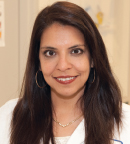
Arti Hurria, MD
Arti Hurria, MD, a geriatric oncologist at City of Hope in Duarte, California, is the first graduate of ASCO’s Leadership Development Program to be elected to ASCO’s Board of Directors. Within 5 years of completing the program, Dr. Hurria went from learning leadership skills to applying them to affect change for people throughout the world with cancer.
Former Chair and Mentor of the Leadership Development Program and 1997–1998 ASCO President Robert J. Mayer, MD, FASCO, remarked, “It is incredibly gratifying for those of us who helped launch the Leadership Development Program to observe the outstanding accomplishments of Dr. Hurria and her colleagues. In the 7 short years since the program’s inception, graduates of the program have risen to leadership roles within the ASCO organization and have also assumed major departmental leadership positions throughout the academic oncology community.”
ASCO’s Leadership Development Program began in 2009–2010. The year-long program was created to teach physicians who have completed subspecialty training leadership skills and help them gain exposure to the role and mission of ASCO. During their time in the program, participants receive mentorship from ASCO leadership, are exposed to U.S. government research agencies and gain first-hand advocacy experience on Capitol Hill.
Ongoing Involvement
Dr. Hurria had been involved with ASCO since completing her fellowship. She received the ASCO Young Investigator Award in 2002–2003 and the ASCO Career Development Award in 2005–2009. When she first learned about the new Leadership Development Program, she said her interest was immediate.
“It was still early in the development of the program, and entry was very competitive,” Dr. Hurria recalled. “It looked like such an incredible opportunity that I knew I needed to apply and at least try to get in.”
According to Dr. Hurria, she was drawn to the Leadership Development Program because she was beginning to recognize the growing need for leadership skills within the practice of medicine. Many physicians lack any formal leadership training and instead learn over time and by example.
“We typically would learn how to be a leader from those who are one step ahead of us in their careers, but leadership is actually a skill set that can be fostered and, if attention is paid and time devoted, that skill set can be used to affect change and foster the growth of others,” she said.
Once she was accepted into the program, Dr. Hurria began to learn about the many different angles of leadership; how to hone and foster leadership skills; and how to navigate challenging aspects of being a leader.
“For me, one of the challenges of leadership had always been conflict resolution, but dealing with conflict is an essential part of leadership,” she said. “The program gave me insights into who I am and how I can best use my strengths to address things like conflict.”
In addition to teaching her specific leadership skills, Dr. Hurria said that the program opened her eyes to thinking about medicine in a much broader fashion.
“Through the program, we had the opportunity to go to Capitol Hill and begin to understand the process of advocating and go to the [U.S. Food and Drug Administration] to learn about the process that leads to the approval of drugs,” Dr. Hurria said. “It was these opportunities that opened my eyes and showed me that physicians can affect change—not just on the individual patient level, but in a national or global sense.”
Applying Leadership Lessons
Dr. Hurria said she was able to use the skills she learned in the program immediately. One of her greatest takeaways was learning how to support and foster the growth of individuals who are part of her team. For example, after the program, she helped to create the Cancer Aging Resource Group, a national grassroots group of individuals interested in seeing geriatric oncology grow as a field.
“I lead the group, but it was very much a shared model of leadership that I worked to foster,” she said. “The success of the group is dependent on the success of the individuals within the group.”
ASCO leadership and membership recognized Dr. Hurria’s hard work and leadership skills when, in January, she was one of four new members elected to the ASCO Board of Directors.
“Being a part of the ASCO Board of Directors has been the opportunity of a lifetime,” she said. “Never in my wildest dreams did I think I would be approached for this opportunity.”
Her colleagues in geriatric oncology are very excited for her to have a voice and presence on the board.
“Being on the ASCO board allows you to be of service to your fellow oncologists by thinking—not just at a national but an international level—about how we can work together to implement programs to improve care of patients,” she said. “To know that by being present and active and participating, that we can address the mission of helping patients with cancer across the world is an amazing opportunity.”
It is for this reason that Dr. Hurria encourages everyone to get involved in volunteer opportunities within ASCO.
“Every time I have been of service it feels like I get tenfold given back in terms of what I learn and have been able to pass on,” Dr. Hurria said. “The opportunities to work with fellow oncologists have been some of the most satisfying parts of my career. I would encourage my fellow oncologists not to miss that opportunity.” ■
© 2016. American Society of Clinical Oncology. All rights reserved.

